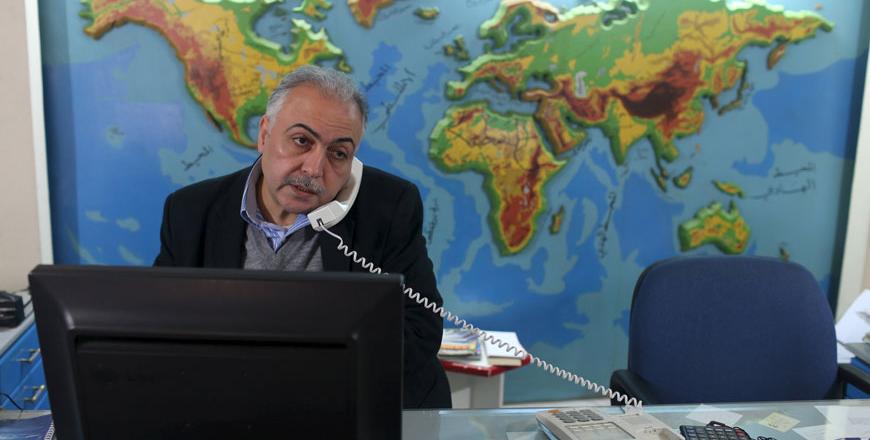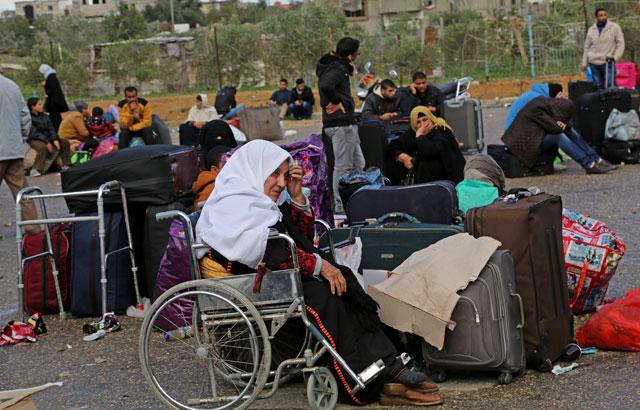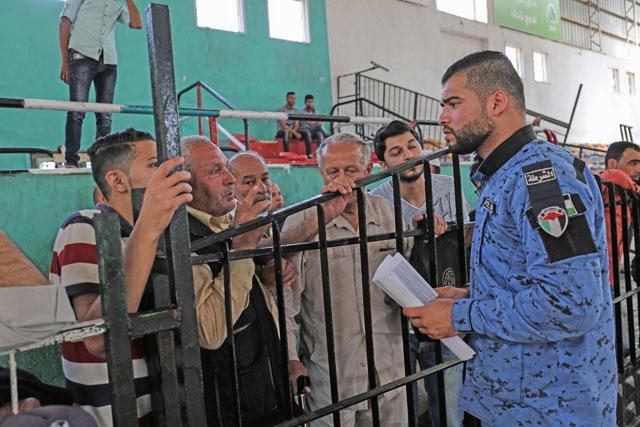You are here
Travel agency in isolated Gaza recalls the ‘golden’ 1950s
By Reuters - Feb 06,2016 - Last updated at Feb 06,2016

Palestinian travel agent Nabil Shurafa speaks on a phone at his office in Gaza City on Thursday (Reuters photo)
GAZA — Nabil Shurafa's travel agency in Gaza was once packed with clients booking flights to London, Paris, New York or cities across the Arab world. These days, he's lucky if anyone comes in, as so few people can get out.
The posters of the Eiffel Tower, the Statue of Liberty and a map of the world look out of place on the walls, given the sense of isolation that pervades Gaza, a narrow strip of land hemmed in by Israel on two sides, Egypt to the south and the blockaded Mediterranean to the west.
"Once borders are closed, things switch off," said Shurafa with a sense of resignation. A plastic model of a passenger plane stands on his desk, next to the silent phones.
When Shurafa's father opened the bureau in 1952, it quickly earned a reputation as a helpful and reliable agency.
Back then, Gaza was governed by Egypt and there was not much of a border to speak of. Gazans could book a plane ticket and take a four-hour bus or train to Cairo to catch their flight.
The agency had a close relationship with BOAC, the forerunner of British Airways and Air France, and is general sale agent for each. It remains a member of IATA, the International Air Transport Association.
"The era from 1952 to 1967 was a golden one," Shurafa, 53, told Reuters. People used to travel to Gaza as well, at least until the 1967 Middle East war, when Israel occupied Gaza and the West Bank.
"Gaza was like a duty-free zone, with Egyptians coming to buy goods brought by merchants from Lebanon," he recalled.
There was also a boom in the late 1990s, after the Oslo peace accords between Israel and the Palestinians, and Gaza opened Yasser Arafat International Airport in 1998.
But the years since have seen a steady decline in business as Gaza has become more and more cut off from the world.
When the second Palestinian uprising erupted in 2000, the airport's runway and control tower were bombed by Israel and it remains in ruins.
Since 2007, when the Islamist group Hamas seized control of the territory following a brief civil war with the Western-backed Fateh movement, entry to and exit from Gaza have become even more restricted, both by Egypt and by Israel.
Links to the world
Israel does allow around 1,000 Gazans to cross into its territory every day, for work, medical treatment or other humanitarian reasons. But it is a far cry from the thousands that could pass through the vast border terminal Israel built in the mid-2000s, before Hamas took over.
Egypt meanwhile has kept its crossing with Gaza mostly closed over the past five years, citing security concerns and to put the squeeze on Hamas. Human rights groups say 95 per cent of Gaza's 1.95 million people cannot get out of the enclave.
Even those that are able to cross into Israel cannot easily travel from there. They need special dispensation to fly out of Tel Aviv's Ben Gurion Airport or to travel to the West Bank and on to Jordan to catch a flight.
Every few months, Egypt lets around 3,000 Gazans leave via Rafah, but the arrangements are a lottery. The crossing stays open only for two or three days, so no one can be sure they will get across. They call Shurafa once they are over the border and the agency then scrambles to book them flights or hotels.
There are currently 15,000 Gazans who have registered requests to travel across Rafah, Palestinian officials say, including 3,000 who say they need medical treatment.
From 1994 to 2000, after Oslo and before the second intifada, Shurafa estimates his office sold 6,000 airline tickets a year. Last year, he sold 120. He's had to let eight staff go and now mostly employs family to keep costs down. He seldom covers his $5,000 monthly rent and running costs.
Mhareb Al Burai, who runs the rival Al Batra tourism office, has faced similar problems. Rather than flights, his agency now focuses on trying to get visas for Dubai, Turkey and China.
"With Rafah largely closed, our main clients are businessmen and merchants, those who have valid permits to cross into Israel and from there travel to Jordan," said the 64-year-old.
For Shurafa, the airline stickers on his glass front door may seem out of place, but he hasn't given up.
"It may sound like satire to talk about a travel agency in a place like Gaza," he said. "But someone has to have hope because this is a history we can't abandon."
Related Articles
Around 630 Palestinians left Gaza and entered the Egyptian Sinai through the Rafah crossing on Sunday after Cairo authorised a temporary reopening of the border, a Palestinian official said.
GAZA CITY, Palestinian Territories — Israel continued with its attack on Gaza on Monday, including in far-southern Rafah, despite US warning
RAFAH, Gaza Strip — Gazans lined up from dawn on Friday to travel across the border into Egypt after President Abdel Fattah Al Sisi said his



















